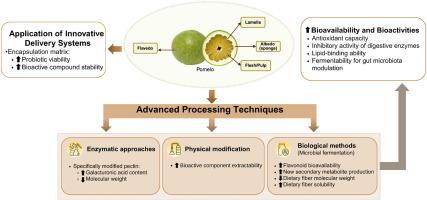Pomelo by-products: A bibliometric review on enhancing gut health and digestive function for metabolic regulation through advanced processing techniques
IF 7
2区 农林科学
Q1 FOOD SCIENCE & TECHNOLOGY
引用次数: 0
Abstract
Pomelo (Citrus maxima or Citrus grandis) is widely cultivated for its edible pulp; however, processing generates substantial quantities of by-products, including peel, pith, sponge layer, and fruitlets, which are typically discarded as waste. Recent research highlights these by-products as abundant sources of bioactive compounds with promising health-promoting properties. This synthesis of current scientific evidence focuses on the potential of pomelo by-products to support gut health and digestive function, with particular emphasis on metabolic regulation. Key bioactive constituents identified in pomelo by-products include dietary fibers, pectins, flavonoids, and essential oils. These compounds have demonstrated the capacity to modulate gut microbiota composition by selectively promoting beneficial bacterial genera and enhancing short-chain fatty acid production. Additionally, pomelo by-products can inhibit carbohydrate-degrading enzymes such as α-glucosidase and lipid-degrading enzymes like pancreatic lipase, contributing to improved glycemic control and lipid metabolism. Furthermore, bile acid binding by pomelo by-product extracts can influence cholesterol metabolism and lipid absorption. Advanced processing technologies including super-comminution, enzymatic modification, fermentation, and pulsed electric field treatments have been investigated to enhance the release, stability, and bioavailability of these bioactive compounds, thereby improving their functional efficacy in food systems. Processing techniques are critically evaluated, highlighting their potential for sustainable upcycling of pomelo processing waste into high-value functional food ingredients and nutraceuticals. Despite encouraging preclinical evidence supporting the health benefits of pomelo by-products, further well-designed clinical trials are necessary to confirm their efficacy and safety in human populations. Overall, pomelo by-products show potential for development into sustainable and functional food ingredients that support gut health, regulate metabolic processes, and contribute to healthier dietary patterns.

柚子副产品:通过先进加工技术促进肠道健康和消化功能代谢调节的文献计量学综述
柚子(Citrus maxima或Citrus grandis)因其可食用的果肉而被广泛种植;然而,加工过程会产生大量的副产品,包括果皮、髓、海绵层和果实,这些通常被当作废物丢弃。最近的研究强调,这些副产品是生物活性化合物的丰富来源,具有促进健康的前景。本文综合了目前的科学证据,重点关注柚子副产品支持肠道健康和消化功能的潜力,特别强调代谢调节。在柚子副产品中发现的主要生物活性成分包括膳食纤维、果胶、类黄酮和精油。这些化合物通过选择性地促进有益菌属和促进短链脂肪酸的产生来调节肠道微生物群的组成。此外,柚子副产物可以抑制α-葡萄糖苷酶等碳水化合物降解酶和胰脂肪酶等脂质降解酶,有助于改善血糖控制和脂质代谢。此外,柚子副产物提取物结合胆汁酸可以影响胆固醇代谢和脂质吸收。包括超粉碎、酶修饰、发酵和脉冲电场处理在内的先进加工技术已经被研究,以增强这些生物活性化合物的释放、稳定性和生物利用度,从而提高它们在食品系统中的功能功效。对加工技术进行了严格评估,强调了其将柚子加工废弃物可持续升级为高价值功能性食品配料和营养保健品的潜力。尽管令人鼓舞的临床前证据支持柚子副产品的健康益处,但需要进一步精心设计的临床试验来确认其在人群中的有效性和安全性。总的来说,柚子副产品显示出发展成为可持续和功能性食品成分的潜力,这些成分支持肠道健康,调节代谢过程,并有助于更健康的饮食模式。
本文章由计算机程序翻译,如有差异,请以英文原文为准。
求助全文
约1分钟内获得全文
求助全文
来源期刊

Current Research in Food Science
Agricultural and Biological Sciences-Food Science
CiteScore
7.40
自引率
3.20%
发文量
232
审稿时长
84 days
期刊介绍:
Current Research in Food Science is an international peer-reviewed journal dedicated to advancing the breadth of knowledge in the field of food science. It serves as a platform for publishing original research articles and short communications that encompass a wide array of topics, including food chemistry, physics, microbiology, nutrition, nutraceuticals, process and package engineering, materials science, food sustainability, and food security. By covering these diverse areas, the journal aims to provide a comprehensive source of the latest scientific findings and technological advancements that are shaping the future of the food industry. The journal's scope is designed to address the multidisciplinary nature of food science, reflecting its commitment to promoting innovation and ensuring the safety and quality of the food supply.
 求助内容:
求助内容: 应助结果提醒方式:
应助结果提醒方式:


